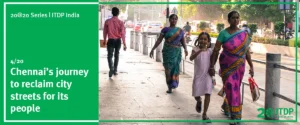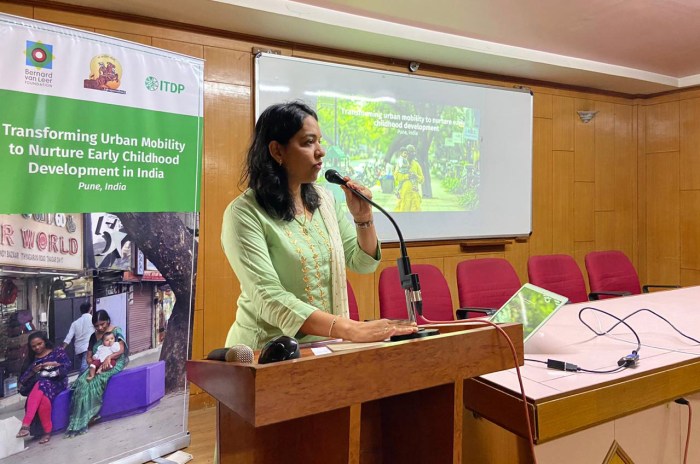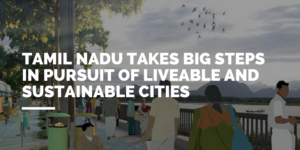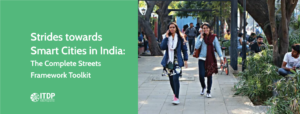
Written by Keshav Suryanarayanan
Pune is leading the country in creating a city that is inclusive of the needs of infants, toddlers and their caregivers. The ITDP India Programme, with the support of the Bernard van Leer Foundation (BvLF), initiated work on a programme with the Pune Municipal Corporation that aims at ‘Transforming Urban Mobility to Nurture Early Childhood Development in India’. The initiative was launched by the Additional Municipal Commissioner of the Pune Municipal Corporation on the 9th of December 2019.
Written by Keshav Suryanarayanan

cities designed for children
cities designed for children
“Are our cities designed for children?”
This is an easy question to answer. Streets are designed as corridors for motor vehicles and very rarely even have safe walking space for adults, let alone children. People have to compete with cars and two-wheelers for space to move through the cities. Very little infrastructure is designed keeping in mind the needs of young children.
Designing for children with their limited range of travel and slower pace, can simultaneously address the needs of other vulnerable groups such as the elderly and disabled. Then, should we not be prioritising the needs of the youngest among us while building our cities, ensuring that children can travel around our cities freely, safely, and without fear?
This brings us to another important question, “How can our cities be designed for children?”
A question that was on everybody’s minds at the launch of the initiative aimed at ‘Transforming Urban Mobility to Nurture Early Childhood Development in India’ under the Bernard van Leer Foundation’s (BvLF) global Urban95 initiative for children between the ages of 0-5 years and their caregivers. Launching the initiative in Pune on the 9th of December, Rubal Agarwal, Additional Commissioner of the Pune Municipal Corporation (PMC) said, “Pune is a pioneering city in many ways and we welcome initiatives such as Urban95 to transform urban areas and make them children and caregivers-friendly. We are proud to launch the project in Pune in collaboration with ITDP and BvLF and look forward to participating in nurturing early childhood development.”

Rubal Agarwal, Additional Commissioner- PMC, launching the initiative
Rubal Agarwal, Additional Commissioner- PMC, launching the initiative
Speaking at the launch, Shreya Gadepalli, South Asia Programme Lead, ITDP, presented the vision for the city and the initiative, “In India and across many fast-developing countries, the ever-increasing investments are not focused enough on incorporating the needs of infants, toddlers, and caregivers. Under this programme and with BvLF’s support, we hope that cities like Pune become lighthouses for other cities in Maharashtra and the country to incorporate the needs of young children and families in their mobility policies, plans, and projects.”

Shreya Gadepalli speaking at the launch
Shreya Gadepalli speaking at the launch
The event was also attended by government officials from the Roads and Family Planning Departments. Representatives from local organisations such as MASHAL, Centre for Environment Education, Parisar, Prasanna Desai Architects, and Shelter Associates suggested various ways for Pune to become a child-friendly city. The discussion brought up many important factors and considerations for the initiative to focus on.
The presentation session was followed by a panel discussion with Shreya Gadepalli, Rushda Majeed – Country Representative for India BvLF, Cecilia Vaca Jones – Progamme Director BvLF, Dinkar Gojare- Executive Engineer, PMC Roads Department, and Milind Khedkar- Medical Officer, PMC Family Planning Department, and moderated by Aswathy Dilip, Senior Programme Manager, ITDP India Programme.
The panelists and members of the audience had an active discussion that brought up many important factors and considerations for the initiative to focus on. The panellists emphasised the need for all developments to be done with a holistic and integrated approach. Policies and guidelines are necessary, but it is also the responsibility of citizens to participate in the process, demand, and ensure the maintenance of facilities used by the children. Members of the audience also highlighted the importance of scaling up the initiatives to the city level through quick steps like Tactical Urbanism interventions.

Speaking about the factors to ensure scaling up of the initiative, Cecilia said, “It is vital to have continuous documentation of what is working and what is not, and a good communication strategy to scale up the work at the state and national level. Understanding the financing of such initiatives is also very important for a long term engagement.”
Speaking about the importance of safe and high quality urban mobility to ensure the wellbeing of children and their caregivers, Rushda Majeed said, “Babies and toddlers are dependent on their primary caregiver, be it mothers, fathers, elder siblings or grandparents, to get around. If walking conditions and public transport are poor, they are less likely to be able to go out with their parents and grandparents, have uncomfortable or long commutes, be exposed to unsafe environments, and have limited options for physical activities.”
Mobility policies that focus on ITC would equip decision makers to invest in sustainable mobility – walking, cycling, and public transport – with specific interventions and improvements dedicated for early childhood development to increase safety, convenience, and vibrancy of public spaces, and improve access to childhood services such as health care, education, and play.

With several developments to make the city more inclusive, Pune is already on its way to becoming a “City for all”. Highlighting the work done in Pune, Dinkar Gojare said, “The PMC has already adopted the Urban Street Design Guidelines, a “Pedestrian First” policy, and implemented several road safety improvement projects. 100 km of street redesign is already on its way. A Children’s traffic Club has been initiated, along with other place making projects. Open spaces are available but they are misused. We should begin with freeing up about 25% of them for projects that ensure early childhood development.”

The programme that is now set in motion will build on this work and see Pune transform itself into India’s first safe and accessible city for infants, toddlers and their caregivers and a model for other cities to emulate. The ITDP India team and BvLF will support PMC to make this dream a reality.
With a clear vision and people’s support, Pune is building a future where cities are designed for children. After all, a city for children is a city for all!
Recent Blogs


Tamil Nadu taking giant strides in pursuit of liveable sustainable cities

